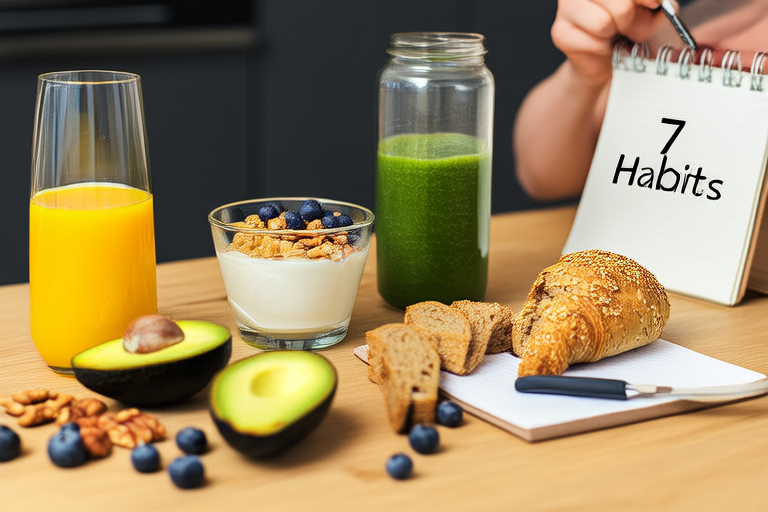Boosting Health and Wellness Through Seven Key Habits
The pursuit of overall well-being is an essential aspect of modern life. It encompasses not only physical health but also mental and emotional well-being. In today’s fast-paced world, it is easy to overlook the importance of our health in favor of work, family, or other commitments. However, taking care of your health is crucial for leading a fulfilling and joyful life. By incorporating seven key habits into your daily routine, you can significantly enhance your overall well-being and experience a greater sense of balance and vitality.
Habit 1: Prioritize Regular Physical Activity
Physical activity is one of the most effective ways to boost health and wellness. Regular exercise has numerous benefits for both the body and the mind. Firstly, it helps maintain a healthy weight and reduces the risk of chronic diseases such as heart disease, diabetes, and certain cancers. Secondly, it strengthens muscles and bones, improving posture and reducing the risk of injury. Thirdly, it enhances cardiovascular fitness, which improves blood circulation and oxygen delivery to tissues. Fourthly, it boosts mood and reduces symptoms of depression and anxiety. Exercise releases endorphins, the brain’s feel-good chemicals, which promote feelings of happiness and well-being. Finally, it promotes better sleep, which is essential for physical recovery and mental clarity.
To incorporate regular physical activity into your routine, start by setting realistic goals. Aim for at least 150 minutes of moderate-intensity aerobic activity or 75 minutes of vigorous-intensity aerobic activity per week. You can break this down into shorter sessions, such as 30 minutes of brisk walking five days a week. Additionally, incorporate strength training exercises at least two days a week. Strength training can include bodyweight exercises like push-ups and squats, resistance band workouts, or weightlifting at a gym. Find activities that you enjoy, whether it’s dancing, cycling, swimming, or playing team sports. This will make it easier to stay motivated and consistent. Remember, any movement is better than none, so even small changes, such as taking the stairs instead of the elevator or parking farther away from your destination, can contribute to your overall fitness.
Habit 2: Embrace a Balanced Diet Rich in Nutrients
A balanced diet is crucial for providing the body with the necessary nutrients to function optimally. A diet rich in fruits, vegetables, whole grains, lean proteins, and healthy fats supports overall health and well-being. Fruits and vegetables are packed with vitamins, minerals, and antioxidants that protect cells from damage and reduce inflammation. Whole grains, such as brown rice, quinoa, and oats, provide complex carbohydrates that fuel the body and promote digestive health. Lean proteins, including chicken, fish, tofu, and legumes, help build and repair tissues and support immune function. Healthy fats, found in avocados, nuts, seeds, and olive oil, provide energy and support brain function.
To embrace a balanced diet, start by focusing on portion control and mindful eating. Pay attention to hunger and fullness cues, and avoid overeating. Plan meals and snacks ahead of time to ensure you have healthy options available. Incorporate a variety of colorful fruits and vegetables into your meals to maximize nutrient intake. Choose whole foods over processed foods whenever possible, as they tend to be higher in nutrients and lower in unhealthy additives. Stay hydrated by drinking plenty of water throughout the day. If you’re unsure about how to plan your meals, consider consulting a registered dietitian or nutritionist who can provide personalized guidance based on your individual needs and preferences.
Habit 3: Ensure Adequate Sleep for Recovery and Mental Clarity
Sleep is often referred to as the body’s reset button, and for good reason. During sleep, the body undergoes various processes that are essential for recovery and mental clarity. Quality sleep helps regulate hormones that control appetite, metabolism, and stress levels. It also plays a crucial role in memory consolidation, problem-solving, and creativity. Lack of sleep can lead to decreased cognitive function, impaired judgment, and increased risk of accidents. Moreover, chronic sleep deprivation is associated with an increased risk of chronic diseases such as obesity, diabetes, and cardiovascular disease.
To improve the quality of your sleep, establish a consistent sleep schedule by going to bed and waking up at the same time every day, even on weekends. Create a relaxing bedtime routine that signals to your body that it’s time to wind down, such as reading a book, taking a warm bath, or practicing deep breathing exercises. Limit exposure to screens, including smartphones, tablets, and computers, at least an hour before bedtime, as the blue light emitted by these devices can interfere with the production of melatonin, the hormone that regulates sleep. Optimize your sleep environment by keeping the bedroom cool, dark, and quiet. Consider investing in blackout curtains, earplugs, or a white noise machine if necessary. Avoid consuming caffeine, nicotine, or heavy meals close to bedtime, as they can disrupt sleep.
Habit 4: Practice Stress Management Techniques
In today’s fast-paced world, stress is an inevitable part of life. Chronic stress can take a toll on both physical and mental health, leading to issues such as high blood pressure, weakened immune system, and increased risk of depression and anxiety. However, there are effective techniques for managing stress and promoting relaxation. One popular method is meditation, which involves focusing the mind on a specific object, thought, or activity to train attention and awareness. Mindfulness, another technique, involves being present in the moment and fully engaging with the current experience without judgment. Both practices can help reduce stress, improve mood, and enhance overall well-being.
To incorporate stress management techniques into your daily routine, start by setting aside time each day for relaxation. Even just 10-15 minutes can make a difference. Find a quiet space where you won’t be disturbed, and sit comfortably with your eyes closed. Focus on your breath, noticing the sensation of air entering and leaving your nostrils. If your mind wanders, gently bring your focus back to your breath. Alternatively, try guided meditations or mindfulness apps that can help you get started. Regular practice can help you develop greater resilience to stress and improve your ability to manage challenging situations. Other stress-reducing activities include yoga, tai chi, journaling, and spending time in nature. Experiment with different techniques to find what works best for you.
Habit 5: Stay Hydrated Throughout the Day
Water is essential for life, and staying hydrated is critical for optimal health and well-being. Water helps regulate body temperature, transport nutrients, and eliminate waste products. Dehydration can lead to fatigue, headaches, and reduced cognitive function. It can also impair physical performance, making it more difficult to engage in physical activity. To stay adequately hydrated, aim to drink at least eight glasses of water per day, but individual needs may vary depending on factors such as age, gender, activity level, and climate. Factors such as increased physical activity, heat, and illness may require additional fluid intake.
To ensure you stay hydrated throughout the day, carry a reusable water bottle with you wherever you go. Set reminders on your phone or computer to prompt you to drink water regularly. Infuse your water with slices of lemon, cucumber, or berries for added flavor. Monitor your urine color; pale yellow indicates proper hydration, while darker urine suggests dehydration. Be mindful of your fluid intake during physical activity, especially in hot weather, and consider electrolyte-rich beverages to replenish lost minerals. Avoid sugary drinks and excessive caffeine consumption, as they can dehydrate the body. By making hydration a priority, you can support your body’s functions and maintain optimal health.
Habit 6: Maintain Social Connections for Emotional Support
Maintaining social connections is vital for emotional support and overall well-being. Strong relationships can provide a sense of belonging, purpose, and security. They can also offer emotional support during challenging times and help buffer the effects of stress. Social connections can come in many forms, including family, friends, colleagues, and community groups. Engaging in meaningful conversations, sharing experiences, and offering support can strengthen these relationships and foster a sense of connection.
To maintain social connections, make an effort to spend time with loved ones regularly. Schedule regular meetups, phone calls, or video chats to catch up and share updates. Join clubs, organizations, or groups that align with your interests to meet new people and expand your social network. Volunteer for causes you care about to give back to the community and connect with others who share similar values. Participate in group activities, such as fitness classes, book clubs, or hobby groups, to foster camaraderie and shared experiences. Show appreciation and gratitude to those in your life by expressing thanks and offering acts of kindness. By nurturing social connections, you can enhance your emotional well-being and create a supportive network of people who care about you.
Habit 7: Schedule Regular Health Check-Ups for Preventive Care
Scheduling regular health check-ups is essential for preventive care and early detection of potential health issues. Routine screenings and examinations can identify conditions before they become serious, allowing for timely intervention and treatment. Preventive care can also help you maintain optimal health and prevent the development of chronic diseases. Regular check-ups typically involve a comprehensive medical history review, physical examination, and screening tests tailored to your age, gender, and personal risk factors.
To schedule regular health check-ups, consult with your healthcare provider to determine the appropriate frequency and types of screenings based on your individual needs. Keep track of important dates and set reminders to ensure you don’t miss appointments. Take advantage of preventive services offered by your insurance plan, such as vaccinations, cancer screenings, and cholesterol checks. Be proactive about discussing any concerns or symptoms with your healthcare provider, even if they seem minor. By prioritizing preventive care, you can take control of your health and well-being and reduce the risk of developing serious health conditions.
Conclusion
By incorporating these seven key habits into your daily routine, you can significantly enhance your overall well-being and experience a greater sense of balance and vitality. Prioritizing regular physical activity, embracing a balanced diet rich in nutrients, ensuring adequate sleep for recovery and mental clarity, practicing stress management techniques, staying hydrated throughout the day, maintaining social connections for emotional support, and scheduling regular health check-ups for preventive care can all contribute to a healthier and happier lifestyle. Each habit plays a unique role in supporting different aspects of health and well-being, and together, they create a holistic approach to wellness. By making these habits a priority, you can achieve a higher quality of life and enjoy the many benefits of optimal health and well-being.










